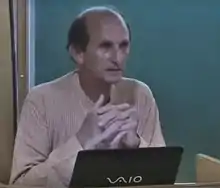Michel Danino
Michel Danino (born 4 June 1956) is a French-born Indian writer.[1] He is a guest professor at IIT Gandhinagar[2] and has been a member of the Indian Council of Historical Research. In 2017, Government of India conferred Padma Shri, the fourth-highest civilian honor for his contribution towards Literature & Education.[3]
Michel Danino | |
|---|---|
 | |
| Born | |
| Nationality | French (former) Indian |
| Occupation | Writer |
| Organization | IIT Gandhinagar |
| Honours | Padma Shri |
Life in India
Danino spent a few years in Auroville, Tamil Nadu before shifting to the Nilgiri mountains, where he resided for two decades. In 2003, he settled near Coimbatore and accepted Indian citizenship.[1]
Work and reception
Danino wrote The Lost River: On The Trail of the Sarasvati (2010), which tentatively identified the legendary Sarasvati River, mentioned in Rigveda with the current Ghaggar-Hakra River.[4] V Rajamani over Current Science reviewed it in favorable terms and praised Danino for his meticulous research.[5]
Peter Heehs's opinion of one of Danino's works, Sri Aurobindo and Indian Civilization, is that it was lacking in linguistic knowledge, and being made up by attacks on colonial orientalists and half-informed invocations of nationalist orientalists.[6] Heehs also criticized Danino's other works for appropriating Sri Aurobindo in his campaign against the Indo-Aryan migrations, and for distorting Aurobindo's speculative views as assertions.[6] Heehs added that Danino selectively cherry-picked quotes from his draft-manuscripts and ignored his published works, which were far more nuanced.[6] Others have accused Danino of pursuing a sectarian Hindutva oriented scholarship based on historical negationism.[7][8][9]
Danino was a contributing author to an encyclopedic volume by Wiley-Blackwell, on South Asian history and archaeology, about the domain of Indus Valley civilisation.[10]
See also
- Indigenous Aryanists
References
- Pande Daniel, Vaihayasi. "The Sarasvati was more sacred than Ganga". Rediff.com. Retrieved 8 August 2011.
Technically, I am not a 'foreigner': I adopted Indian citizenship some years ago.
- "Michel Danino - IIT Gandhinagar". www.iitgn.ac.in. Archived from the original on 4 January 2017. Retrieved 12 November 2013.
- "PadmaAwards-2017" (PDF). Archived from the original (PDF) on 29 January 2017.
- "TOI Crest: Quick review". The Times of India. 29 May 2010. Retrieved 17 February 2020.
- Rajamani, V. (2010). "Review of The Lost River – On the Trail of the Sarasvati". Current Science. 99 (12): 1842–1843. ISSN 0011-3891. JSTOR 24073512.
- Heehs, Peter (2003). "Shades of Orientalism: Paradoxes and Problems in Indian Historiography". History and Theory. 42 (2): 169–195. doi:10.1111/1468-2303.00238. ISSN 0018-2656. JSTOR 3590880.
- Guha, Sudeshna (2005). "Negotiating Evidence: History, Archaeology and the Indus Civilisation". Modern Asian Studies. 39 (2): 399–426. doi:10.1017/S0026749X04001611. ISSN 0026-749X. JSTOR 3876625. S2CID 145463239.
- Chadha, Ashish (1 February 2011). "Conjuring a river, imagining civilisation: Saraswati, archaeology and science in India". Contributions to Indian Sociology. 45 (1): 55–83. doi:10.1177/006996671004500103. ISSN 0069-9667. S2CID 144701033.
- Bhatt, Chetan (1 January 2000). "Dharmo rakshati rakshitah : Hindutva movements in the UK". Ethnic and Racial Studies. 23 (3): 559–593. doi:10.1080/014198700328999. ISSN 0141-9870. S2CID 144085595.
- Schug, Gwen Robbins; Walimbe, Subhash R., eds. (8 June 2016). A Companion to South Asia in the Past. doi:10.1002/9781119055280. ISBN 9781119055280. S2CID 132664143.
External links
- Michel Danino homepage at IIT-G Archived 4 January 2017 at the Wayback Machine